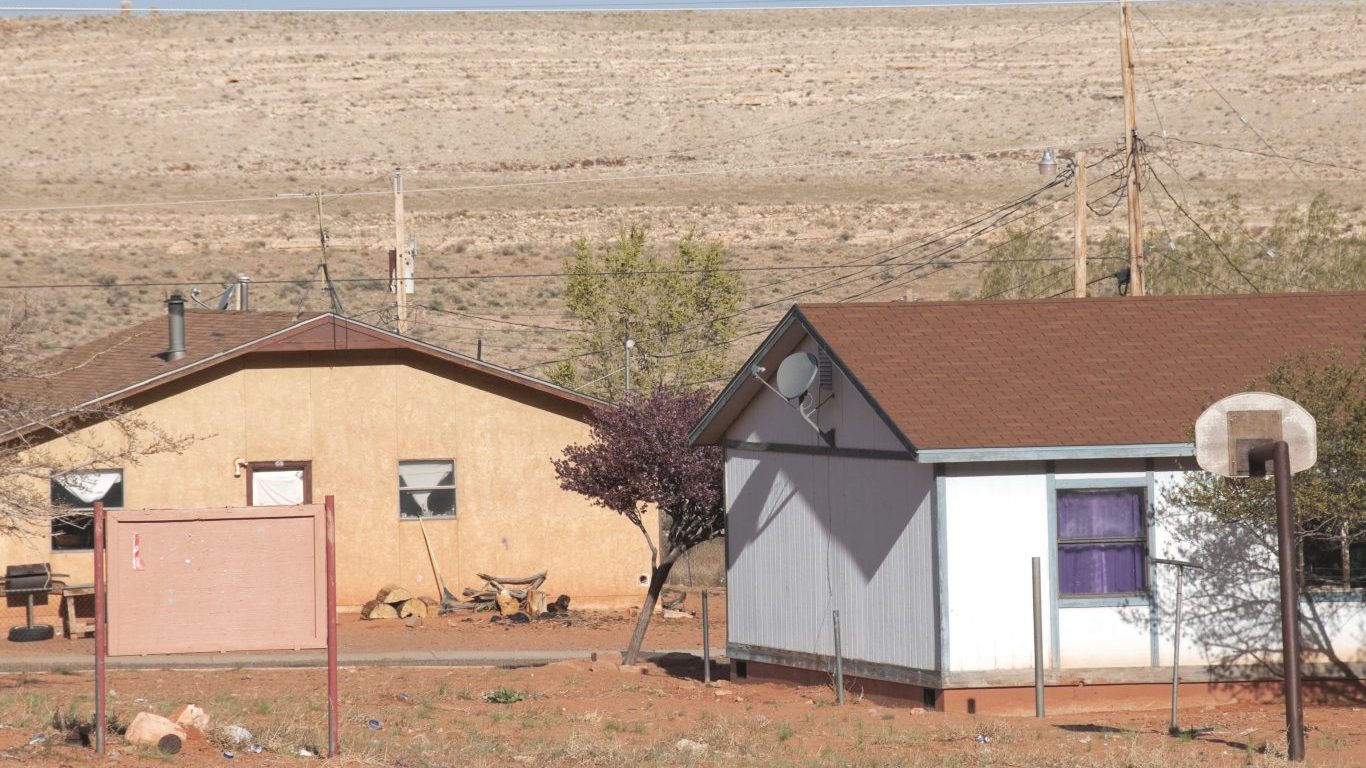

Gaining rights and freedoms and having them codified in a document has been a very long struggle for people all over the world. Even in the 21st century, even among the world’s most affluent countries, that quest continues.
To discover the year each of the world’s 25 most affluent nations adopted a constitution (if they did), 24/7 Tempo used GDP per capita to identify the richest nations, and vetted the year each constitution was adopted by reviewing sources including national websites, Britannica, and Global Security.
If you remember your grade-school history, you’ll recall the first written record that limited a monarch’s power was England’s Magna Carta in 1215. That document wasn’t a constitution, but it established the idea of codifying – and limiting – the powers of a head of state.
It would be more than 500 years before the United States adopted its constitution in 1788, after declaring independence from Great Britain. Imbued with the Enlightenment-era beliefs of reason, liberty, and progress, the U.S. Constitution became the benchmark for guaranteeing free speech, freedom of religion, and many other rights and liberties. (How free is the press in the world’s richest countries?)
In the 19th century, the Low Countries of Belgium, the Netherlands, and Luxembourg and the Scandinavian nations of Norway, Sweden, and Denmark all adopted constitutions. Some of these countries had recently gained independence and all of them had a monarchy, though the sovereign’s power was constrained by their constitutions.
As nations in Africa, Asia, and the Caribbean cast off or redefined the relationship with their colonial overseers in the 20th century and formed representative governments, they also adopted constitutions. Even though countries such as Bermuda and New Zealand loosened their ties with Great Britain, the British monarch still retains the right to name the chief executive who rules in the sovereign’s name in those nations. (Here’s a list of every country in the British Commonwealth.)
Qatar, on the Arabian Peninsula, is the most recent nation on our list to have adopted a constitution, in 2004. Another Middle Eastern nation, Israel, is on our list though its legislators have not yet successfully managed to agree on the terms of a constitution.
Click here to see when the world’s richest countries got their constitutions (if they did)
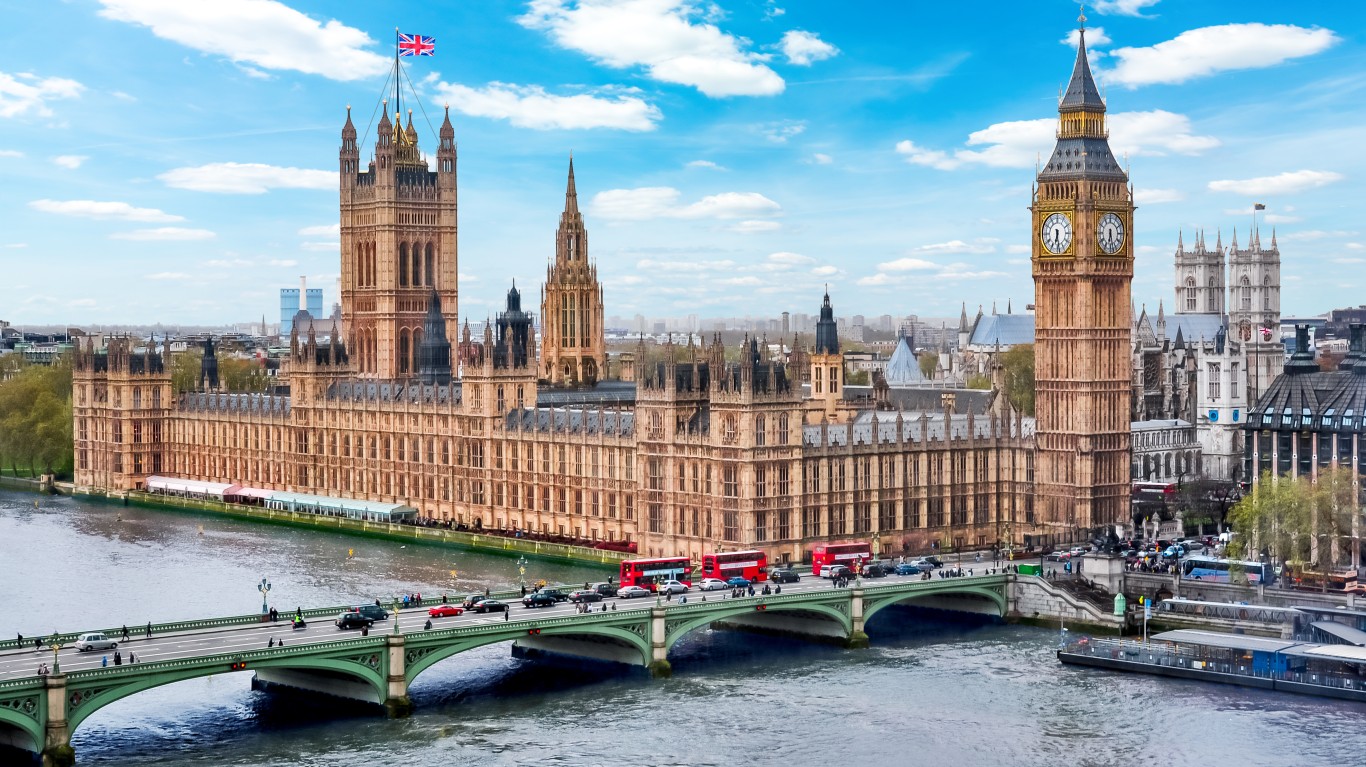
United Kingdom
> Year constitution was adopted: Various
> GDP per capita: $46,510 – #25 highest
England’s Magna Carta, the document born out of a political crisis between King John and the nobility in 1215, setting limits on royal authority, is sometimes called Europe’s first constitution. However, the UK today has no formal codified constitution. Instead, its “constitution” is made up of a body of laws, legal decisions, conventions, and treaties spanning the nation’s history. Magna Carta is one of the documents included – but only four of its 63 clauses are still legally valid today. There have been numerous attempts to create a single written constitution, most recently in 2015.
[in-text-ad]

United States
> Year constitution was adopted: 1788 (ratified), 1789 (effective)
> GDP per capita: $70,249 – #9 highest
The Constitution of the United States was the first real written constitution in the world. (The tiny European state of San Marino dates its constitution to 1600, but not all of its provisions have become law, so it is usually not counted.) The famous Preamble to the Constitution explains its purpose: “We the People of the United States, in Order to form a more perfect Union, establish Justice, insure domestic Tranquility, provide for the common defence, promote the general Welfare, and secure the Blessings of Liberty to ourselves and our Posterity, do ordain and establish this Constitution for the United States of America.”
There are seven articles in the Constitution that detail how government is to be operated, outlining powers of the three branches of government – legislative (Congress), executive (office of the president), and judicial (federal court system). The remaining articles describe the relationship of the states to the federal government, establish the Constitution as the supreme law of the land, and define the amendment and ratification processes.
The Bill of Rights comprises the first 10 amendments to the Constitution. These amendments added guarantees of personal freedoms and rights, limitations on the government’s power, and declarations that all powers not specifically granted to the federal government by the Constitution are reserved to the states or the people.

Sweden
> Year constitution was adopted: Various
> GDP per capita: $61,029 – #14 highest
According to the official website of the Swedish legislature, the country has had a written constitution since the mid-14th century. Various acts came into force in the following years, but the modern Swedish constitution is considered to have been born in 1809 with the Instrument of Government and two associated acts concerning separation of powers, freedom of the press, and rules for succession. Numerous amendments and other changes have been instituted since then, including rules adopted in 1974 limiting the authority of the monarchy, and a provision added in 1979 that grants women the right of succession to the throne – a right previously reserved to the male blood line.

Norway
> Year constitution was adopted: 1814
> GDP per capita: $89,154 – #6 highest
The Norwegian constitution, adopted in 1814, is one of the oldest written constitutions in the world. It was founded on the principles of the sovereignty of the people; the separation of powers; and human rights. Norway had been in union with Denmark until 1814, when Napoleon, an ally of Denmark-Norway, was defeated at the Battle of Leipzig. Norway was independent only briefly in 1814 but was able to draw up its constitution then.
[in-text-ad-2]
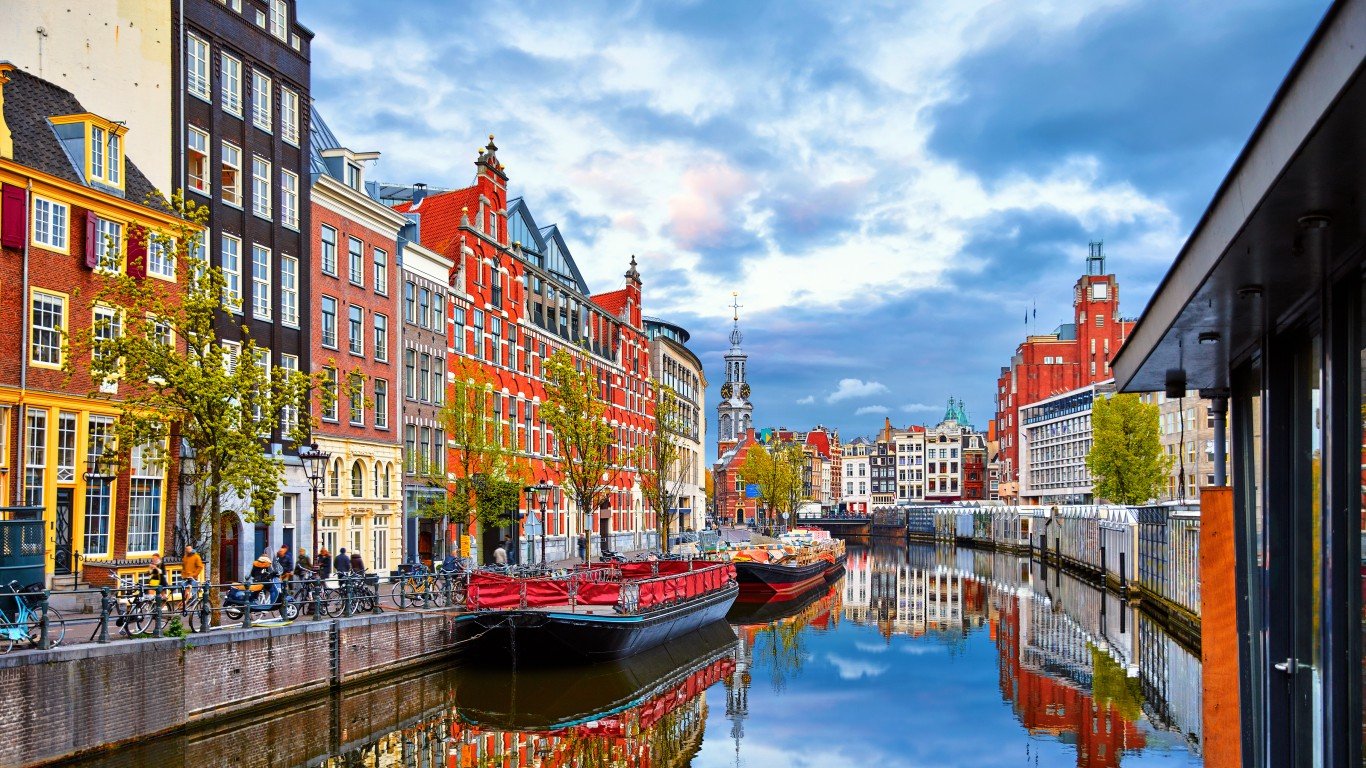
Netherlands
> Year constitution was adopted: 1814
> GDP per capita: $57,768 – #16 highest
After Napoleon was driven out of the Netherlands in 1814 by Russian Cossacks, the Dutch drew up a constitution, which was amended in 1983. The constitution contains fundamental rights that include: freedom of expression; the right to privacy; the right to vote and to stand for election; and the right to equal treatment.
The Netherlands is a constitutional monarchy and the monarch is the head of state of the Kingdom of the Netherlands. The nation’s ministers, not the monarch, are responsible for government actions and are accountable to parliament for government policy.

Belgium
> Year constitution was adopted: 1831
> GDP per capita: $51,247 – #21 highest
Belgium was created in 1830, broken off from the Netherlands. The Belgian National Congress had decided that the country should be a monarchy, and the sovereign had to be acceptable to both Great Britain and France. Belgium chose Prince Leopold of Saxe-Coburg, who was related to the British royal family and who became engaged to the daughter of the French king. He vowed to support the constitution, which gave the greater part of the governing power to a parliament elected by property owners.
Other aspects of the constitution were progressive. The document said no Belgian could be deprived of his or her freedom in any way, except as ordered by a court. Property rights were upheld, as were freedom of the press, the practice of any religion, freedom of education, and the right to associate.
[in-text-ad]

Switzerland
> Year constitution was adopted: 1848
> GDP per capita: $91,992 – #5 highest
In 1848, with revolution sweeping over much of Europe, Switzerland adopted its first constitution, establishing the Swiss federal state. The document was heavily influenced by the American Constitution and the ideals of the French Revolution.
The Swiss constitution established the autonomy of its cantons, unless the constitution expressly restricted their autonomy. Since 1848, the constitution has been revised repeatedly. Swiss citizens can demand an amendment to the constitution or the adoption of a new article by organizing a popular initiative. Any change in the constitution must be approved by a majority of voters and a majority of cantons.
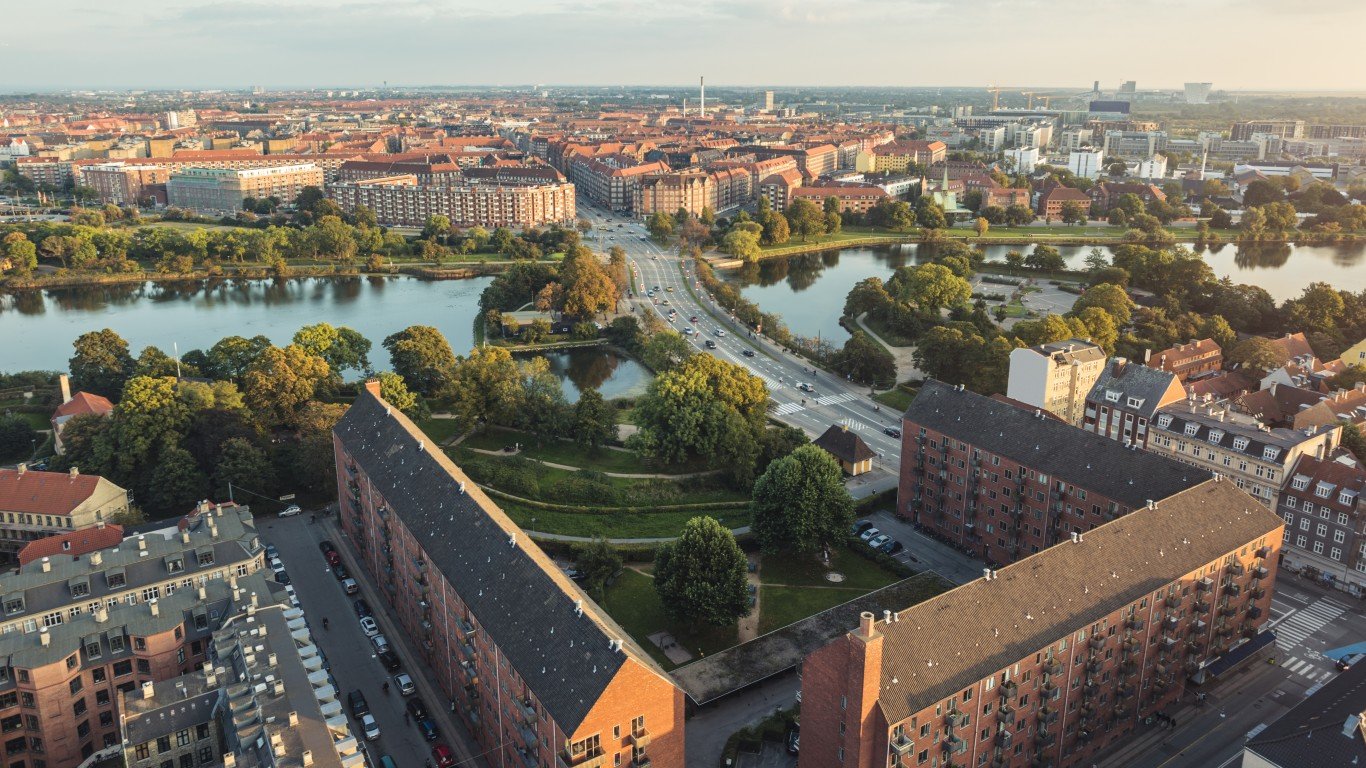
Denmark
> Year constitution was adopted: 1849
> GDP per capita: $68,008 – #12 highest
The constitution of Denmark was adopted in 1849 after Christian VIII, sovereign of Denmark, realized that absolute rule would not survive the ascension to the throne of his successor. Known as the June Constitution, the document guaranteed the civic rights of the people and introduced a bicameral system that gave all men the right to vote, though with certain restrictions in one of the houses of representatives.

Canada
> Year constitution was adopted: 1867
> GDP per capita: $51,988 – #20 highest
The first document that comprised the Canadian Constitution was the British North America Act, which came into being in 1867 with the creation of the Dominion of Canada. It outlined the structure of the Canadian government, and distributed the powers between parliament and the provincial parliaments and legislatures. Any proposed changes in the document had to be approved by London – a provision that changed in 1982 with the passage of the Canadian Constitution Act and the addition of the Canadian Charter of Rights and Freedoms. The charter detailed the civil, legal, and mobility rights and fundamental freedoms of Canadians.
[in-text-ad-2]

Luxembourg
> Year constitution was adopted: 1868
> GDP per capita: $133,590 – #2 highest
Luxembourg became an independent nation in 1867 in the aftermath of the Austro-Prussian War, which dissolved the German Confederation. The constitution of Luxembourg, one of the smallest nations in Europe, has been amended many times since its inception as the constitution of a “modern” Luxembourg, most recently in 2019.
Under the current constitution, Luxembourg is a grand duchy headed by a constitutional monarch and governed by a parliamentary democracy with separate executive, legislative, and judicial branches. Besides individual and property rights, women and men are granted equal rights and duties, according to the document.
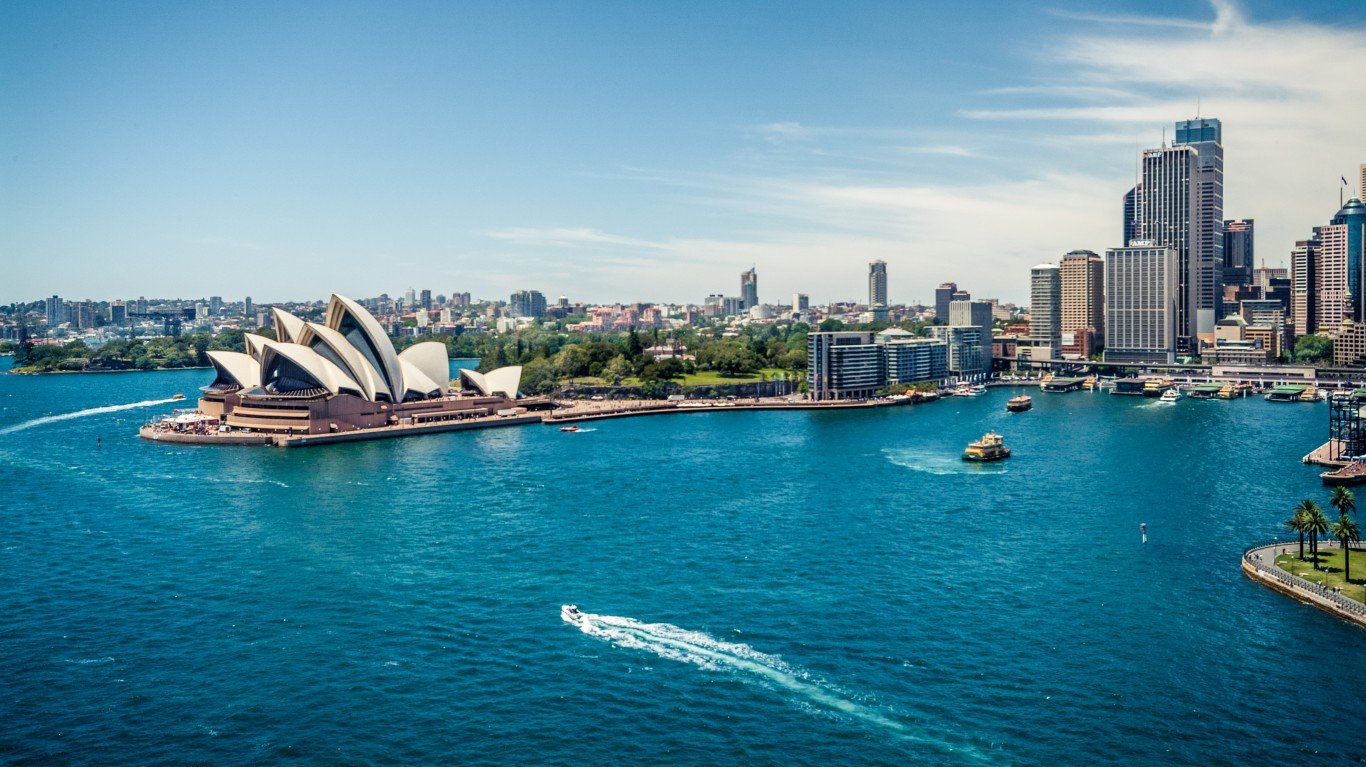
Australia
> Year constitution was adopted: 1901
> GDP per capita: $60,443 – #15 highest
The Australian constitution came into being in 1901 after it was agreed upon by the British Parliament. The document lays out power-sharing agreement in the federal government.
The prime minister and cabinet are not mentioned in the Australian constitution, however. And unlike with the U.S. Constitution, there is no bill of rights. Instead, individual rights are protected by common law enacted by the courts and statute law made by Australia’s parliament. The constitution can only be altered by the approval of the Australian people.
[in-text-ad]
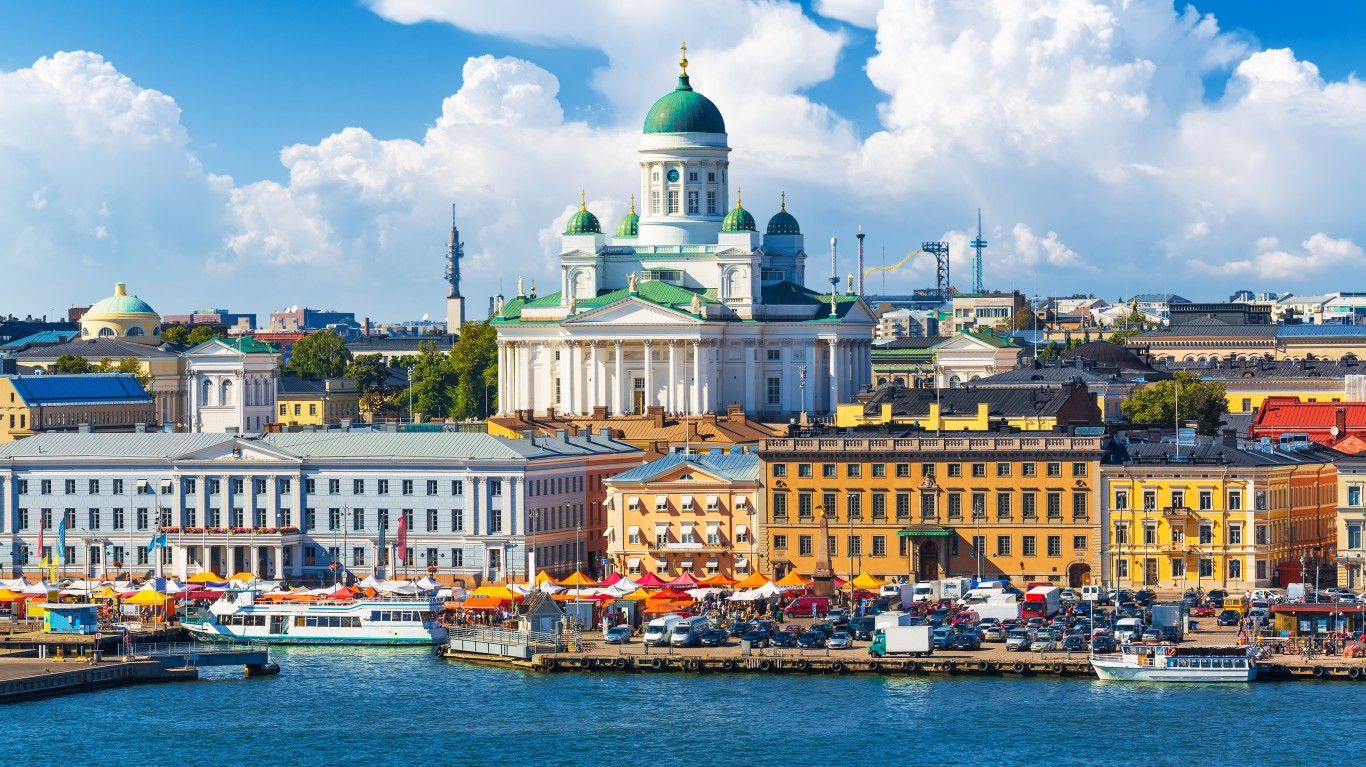
Finland
> Year constitution was adopted: 1919
> GDP per capita: $53,655 – #17 highest
Constitutional government was in the planning stages in Finland before the Scandinavian country became independent from Russia in 1917. Finns, who had some autonomy under the Russian Empire, had created the Parliament Act in 1906 that outlined parliamentary procedures. This was wrapped into the 1919 Constitution Act.
The document enumerated fundamental rights and guaranteed citizens essential liberties, ensured the independence of courts of law, municipal selfâgovernment and the special position of the Evangelical Lutheran Church.

Austria
> Year constitution was adopted: 1920
> GDP per capita: $53,638 – #18 highest
Following the dissolution of the Austro-Hungarian Empire after World War I, Austria created its Federal Constitutional Law (Bundes-Verfassungsgesetz), which is often referred to in its short-hand version, B-VG. After Nazi Germany absorbed Austria in the 1938 Anschluss, the constitution was suspended, but it was reinstated following the defeat of Germany in 1945.
Austria has a parliamentary form of government and executive power is shared by the president and a cabinet. A cabinet is formed by the chancellor, the head of the prevailing political party. Individuals are equal under the law. The federation and municipalities recognize the de facto equality of men and women.

Ireland
> Year constitution was adopted: 1937
> GDP per capita: $100,172 – #4 highest
The constitution of Ireland adopted in 1937 replaced the constitution of the Irish Free State, which had been created after the Irish Civil War in 1922. Among other rights, the document granted women the right to citizenship and the right to vote, on an equal basis with men. The document also guaranteed freedom of worship, and forbade the state from creating an established church. The latter provision diminished the role of the Catholic Church in the daily lives of the Irish people.
[in-text-ad-2]

Iceland
> Year constitution was adopted: 1944
> GDP per capita: $68,728 – #11 highest
Iceland wrote its constitution in 1944. The island nation is a constitutional republic with a multi-party system. The head of state is the president. In 1980, Iceland was the first nation to elect a female president by choosing Vigdís Finnbogadóttir. Among the rights delineated in its constitution is universal equality before the law regardless of sex, religion, opinion, national origin, race, color, property, birth, or other status. Men and women shall enjoy equal rights in all respects.
Iceland has one of the world’s oldest parliamentary democracies, with its parliament, the Althingi, established in 930. Legislative power rests with both the parliament and the president. The judiciary is independent of the executive and the legislature.

Faroe Islands
> Year constitution was adopted: 1948
> GDP per capita: $69,010 – #10 highest
The Faroe Islands, in the North Atlantic between Iceland and the Shetland Islands. form a self-governing overseas administrative division of Denmark. The islands adopted a constitution in 1948 as part of the Home Rule Act of 1948.
Since that time, the islands have assumed legislative and administrative responsibility in the areas of conservation and management of the environment, trade, taxation, energy, emergency preparedness, social security, education, and research. Certain areas remain under the authority of the Danish government such as police, legal framework, immigration and border control, financial regulation, and aviation.
[in-text-ad]

Germany
> Year constitution was adopted: 1949
> GDP per capita: $51,204 – #22 highest
The German constitution was adopted in 1949 with the purpose of preventing the emergence of either an overly fragmented multiparty democracy, similar to the Weimar Republic (1918-33), or an authoritarian institution such as the Nazi dictatorship of the Third Reich (1933-45).
Many of the articles of the constitution delineate the rights of German citizens, such as equality before the law; freedom of speech; right to assembly; freedom of the press; freedom of worship; freedom from discrimination based on race, gender, religion, or political beliefs; and the right to conscientious objection to compulsory military service.

China
> Year constitution was adopted: 1954
> GDP per capita: $49,801 – #23 highest
The first state constitution of the People’s Republic was adopted in 1954, five years after the communists under Mao Zedung emerged victorious over Chiang Kai-Shek and the nationalists.
It lasted until the years of the Cultural Revolution in the 1960s, when the administration was replaced by revolutionary committees.
The statutes of 1954 gave the communist party legal standing and the leading role at every level in the government hierarchy. Party members held all important posts in state institutions.

Cayman Islands
> Year constitution was adopted: 1959
> GDP per capita: $86,569 – #7 highest
Like many British possessions and colonies after World War II, the Cayman Islands sought greater autonomy from Great Britain. The Caymans are a self-governing British Overseas Territory and the largest by population in the western Caribbean Sea. The constitution adopted in 1959 permitted all adult Caymanians the right to vote and run for office.
[in-text-ad-2]

Monaco
> Year constitution was adopted: 1962
> GDP per capita: $234,315 – #the highest
Monaco wrote its first constitution in 1911, following the Monégasque Revolution that ended absolute monarchy in the tiny nation. In 1962, Prince Rainier III oversaw the rewriting of it. The document outlines three branches of government, including several administrative offices and a number of councils, all of which share advisory and legislative power with the prince.
The constitution also defined the line of succession to Monaco’s throne; this section was modified in 2002.

Singapore
> Year constitution was adopted: 1965
> GDP per capita: $72,794 – #8 highest
Singapore separated from Malaysia on Aug. 9, 1965, and a constitution for the city-state was passed four months later. It comprised parts of three separate documents: the constitution of the state of Singapore; the Republic of Singapore Independence Act; and sections of the Malaysian Federal Constitution.
Among the provisions of the Singapore constitution are the freedom of speech, assembly, and association; equal protection under the law; and freedom of religion.
[in-text-ad]

Bermuda
> Year constitution was adopted: 1968
> GDP per capita: $114,090 – #3 highest
Bermuda, with about 70,000 people, is the most populous of Great Britain’s overseas territories. A constitution was adopted in 1968 that spelled out rights and freedoms of the individual such as protection of right to life; protection from inhuman treatment; protection from slavery and forced labor; protection from arbitrary arrest or detention; protection for privacy of home and other property; protection of freedom of expression; freedom of assembly and association; and protection from discrimination based on race.
The governor of Bermuda is appointed by the British monarchy. The legislature consists of the British sovereign, the Senate, and the House of Assembly. The 11 members of the Senate are appointed by the governor, and the House members are elected.
New Zealand
> Year constitution was adopted: Various
> GDP per capita: $48,781 – #24 highest
Like the United Kingdom, New Zealand lacks a single written constitution, though the Constitution Act of 1986 recognizes the British sovereign as the head of state and the nation’s governor-general as its representative, and is a formal statement of the country’s governmental structure, including the separation of powers. Other than that, as the New Zealand government website puts it, the constitution “has a number of sources, including crucial pieces of legislation, several legal documents, common law derived from court decisions as well as established constitutional practices known as conventions.”

Qatar
> Year constitution was adopted: 2004
> GDP per capita: $66,838 – #13 highest
The small nation on the Arabian Peninsula is one of the more recent countries to adopt a constitution. The document says Qatar is an independent sovereign Arab state whose religion is Islam, political system is democratic, legal system is based on Sharia law, and official language is Arabic. The executive authority rests with the amir and rule of the state is hereditary in the family of Al-Thani. Two-thirds of an advisory council are elected and the remainder appointed by the amir.
The constitution upholds personal liberty; safeguards equal rights; and upholds private ownership. It protects the freedoms of expression, the press, and religion, as well as the right to education. Every Qatari citizen must serve in the military.
[in-text-ad-2]

Israel
> Year constitution was adopted: Various
> GDP per capita: $52,171 – #19 highest
The Jewish state, the oldest democracy in the Middle East, has no written constitution. Various attempts to draft the formal document since 1948 have fallen short. Israel has evolved a system of basic laws and rights, which have a semi-constitutional status.
After Israel’s Constituent Assembly was elected in the nation’s first general elections on Jan. 25, 1949, the new nation began the process of writing a constitution. An ongoing debate failed to produce a constitution, so the representative body the Knesset adopted a compromise, transferring the powers of the Constituent Assembly to subsequent Knessets. They introduced a concept called a constitution “by chapters” in which basic laws and rights were built by the Constitution, Law and Justice Committee and would be presented to the Knesset as one formal written document. Eleven basic laws have been enacted, dealing with the powers of the governing bodies and basic human rights.
Take This Retirement Quiz To Get Matched With A Financial Advisor (Sponsored)
Take the quiz below to get matched with a financial advisor today.
Each advisor has been vetted by SmartAsset and is held to a fiduciary standard to act in your best interests.
Here’s how it works:
1. Answer SmartAsset advisor match quiz
2. Review your pre-screened matches at your leisure. Check out the advisors’ profiles.
3. Speak with advisors at no cost to you. Have an introductory call on the phone or introduction in person and choose whom to work with in the future
Take the retirement quiz right here.
Thank you for reading! Have some feedback for us?
Contact the 24/7 Wall St. editorial team.
 24/7 Wall St.
24/7 Wall St. 24/7 Wall St.
24/7 Wall St. 24/7 Wall St.
24/7 Wall St.



